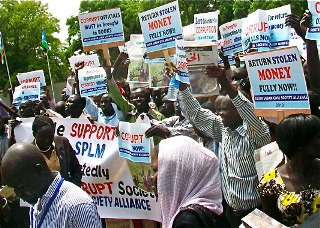“Dual citizenship encouraging corruption in S. Sudan”
By Bonifacio Taban Kuich
February 16, 2013 (BENTIU) – South Sudanese citizens possessing dual citizenship in other countries remain the impetus behind corruption practices in the new nation, a senior member of South Sudan’s ruling party (SPLM) has said.

“I think those [who] have dual citizenship should be reduced. This is another way of fighting corruption. We cannot have people with families in America, and all they do is come and collect money to as to make them [their families] enjoy life in American and elsewhere”, said Diu.
Under Article 45(5) of South Sudan’s Transitional Constitution, a South Sudanese national may acquire the nationality of another country.
The SPLM official, during the interview, urged the country’s leadership to institute a law that limits the number of people seeking dual citizenship in other countries, as a remedy to fight against corruption.
Almost two years since it attained self-rule, South Sudan faces huge challenges in the fight against graft. The country’s anti-corruption body, established through a constitutional provision, has failed to fight corruption in the young nation.
Since its formation in 2005, South Sudan Anti-Corruptions Commission (SSACC) has not implicated a single individual involved in corruption, despite the rhetoric statements from the country’s leadership to stamp out the practice.
Diu, however, says both the south-ruling party and the political parties in the country should take blame for failing to put in place tough measures against corrupt practices.
Wal Mut Kuol, the Unity state chairperson of the anti-corruption commission, admitted corruption is still rampant in the country, estimating that over 65% of the people in South Sudan are corrupt, citing Warrap, Lakes, Jonglei and Unity state as the most corrupt states.
“The leaders empowered by the constitution or the head of departments in South Sudan are [the] most corrupt people”, said Koul in a separate interview.
Kuol, on the other hand, lauded Unity state authorities for initiating a policy of screening staffs physically to detect “ghost” workers in the civil service, as well as fight the practice of nepotism in employment.
“Exactly what happens here in Unity state is tribalism, nepotism and very big embezzlement of public funds, which is wrong”, he remarked.
In May last year, South Sudan President, Salva Kiir wrote to 75 former and current government officials, asking them to account for about $4bn allegedly looted from the state treasury. To recover the funds, an account was opened in a Kenya-based bank.
However, the Unity state anti-corruption boss faulted the government for failure to make public the names of the 75 officials, a move he insists, remains a setback to the fight against corruption.
“If the war [against corruption] starts from the central government, [then] they should investigate or arrest people doing corruptions way. This will enable the rest of the states to fear”, he said.
(ST)
